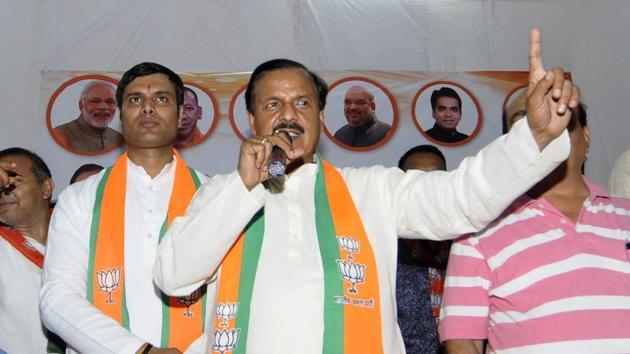Lok Sabha Elections 2019: Mahesh Sharma in fray, as Gautam Buddha Nagar witnesses triangular contest
Incumbent MP Dr Mahesh Sharma of the BJP is seeking a re-election from this seat on a BJP ticket and is pitted against the alliance’s candidate – Satveer Nagar of the BSP – and Dr Arvind Singh of the Congress party, and 10 other candidates.
The Gautam Buddh Nagar parliamentary constituency is set to witness a triangular contest between the Bharatiya Janata Party (BJP), the Bahujan Samaj Party (BSP) - Samajwadi Party (SP) - Rashtriya Lok Dal (RLD) alliance and the Congress; the constituency goes to polls in the first phase of the 2019 general elections on April 11. Poll campaigning ended 5pm Tuesday, as per guidelines of the Election Commission of India.

Incumbent MP Dr Mahesh Sharma of the BJP is seeking a re-election from this seat on a BJP ticket and is pitted against the alliance’s candidate – Satveer Nagar of the BSP – and Dr Arvind Singh of the Congress party, and 10 other candidates.
The constituency has 22,97,478 voters and consists of five assembly segments – Noida, Dadri, Jewar in Gautam Budh Nagar and Sikandrabad and Khurja in Buldanshahr.
All political parties have their own arithmetic to claim victory in this seat, however, political analysts say the verdict will depend on voter turnout from urban areas.
The Noida segment is considered an urban area and has maximum number of voters among the five segments. However, the voter turnout here remains low in comparison to rural segments of Dadri, which has 5,36,130 voters, Jewar with 3,33,537 voters, Sikandrabad with 3,82,466 voters and Khurja with 3,77,250 voters.
The maximum temperature on poll day is expected to touch 40 degrees Celsius, which may keep urban voters from the Noida and Dadri segments indoors.
In 2014, BJP’s Dr Sharma, who owns the Kailash Group of Hospitals, had secured 50% of the votes polled. However, he is facing charges “anti-incumbency” this time, particularly among farmers of Jewar, Dadri and Khurja. The rural populace is miffed with Sharma as they say he has not visited their villages after winning.
However, according to Sharma, after the BJP came to power at the Centre and the state, the district got the Jewar airport, a project which was first mooted in 2001. Also, the Yogi Adityanath-led government brought big ticket investments in the region, including ₹5,000 crore from Samsung, ₹3,500 crore from Vivo Mobile and ₹3,069 crore from Haier, among others.
“I have got sanctioned ₹50,000 crore worth projects in Gautam Buddh Nagar and I will make sure that work for all communities if I get elected again,” Sharma said.
The BSP-SP-RLD alliance, on the other hand, is hoping to turn the tables this time. After forming a joint front, the two main political parties of the state are eyeing support from around 14 lakh rural voters in the constituency.
“This election is between a businessman (Sharma) and a farmer’s son. Sharma has not worked for people here. And I assure everybody that I will work with full dedication for all communities,” 42-year-old Nagar, who is contesting his first elections, said. Coming from a farming family, Nagar’s land was acquired to make way for the Budh International Circuit.
The Congress, which suffered a shock exit of its candidate right before the elections in 2014, has fielded 30-year-old Dr Arvind Singh from this seat. Singh’s family owns the Noida International University in Greater Noida. Singh’s father is a Member of Legislative Council from the BJP.
Singh had contested the 2014 general elections on a BSP ticket from Aligarh and finished as runner-up.
“I want to create jobs for the youth, resolve homebuyers’ issues and work for farmers. I have prepared a 17-point agenda for this seat. I hope people will vote for me because the two other candidates do not have any agenda for this constituency,” Singh said.
Singh, who belongs to the Rajput community, is banking on his community’s support, which has the largest vote bank – four lakh – in the constituency.
The constituency witnessed 60.3% polling in the 2014 Lok Sabha polls, an 11.7% jump over the 2009 elections, when 48.54% voting was recorded. If voter turnout remains low at urban areas, it will spoil the BJP’s prospects. Also, the voter turnout in Dadri, Jewar, Sikandrabad and Khurja usually remains higher than in Noida. If it continues the same way, it will benefit the BSP-SP candidate.
As per the 2011 census, there are 13% Rajput voters, 12% Gujjars, 12% Muslims, 12% Brahmins, 7% Jatav, 6% Vaishya, 5.5% Jat, 4.5% Yadav and 28% other voters.
The BSP-SP alliance is banking upon Muslims, Jatavs, Jats and Yadav voters, who are traditionally considered to vote for the three alliance parties. The BJP is hopeful that if urban voters support their candidate, they can claim victory.






